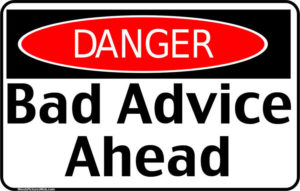Why Most Business Advice Is Useless
Useless advice
“Just be yourself.” Have you received this advice before a big presentation? Or maybe before a big date?
Who else can you be?
Or how about, “Play with feeling!” before a musical performance?
Or how about, “Just stay calm” or “don’t worry about it” before an anxiety-causing interaction?
These are examples of useless advice given more for the person giving it to feel good about themselves than for the advisee.
However much someone saying “Play with feeling!” thinks it helps someone to play with feeling, it doesn’t. If someone can already play with feeling, they will, so the advice doesn’t help. For those who can’t, the reason they don’t isn’t that they don’t want to.
They don’t know how.
Telling them to do something they don’t know how to doesn’t magically enable them to.
Experience, practice, and rehearsal help. They’re the only things that do.
Useless education
A similar pattern happens in education. Our educational system largely works on the premise that teachers know information, students don’t, and if the teacher tells students the information, they’ll learn it. Then testing the students will reveal how much they learned.
In business, factual knowledge and recall don’t help you get ahead. Social and emotional skills do, which lecturing, reading, and testing don’t develop. On the contrary, they teach compliance, which stunts social and emotional development.
How not to learn
The media are full of examples of such useless advice and education. After reading one too many articles about Navy SEAL’s advice for business success, I’m calling my peers out.
I agree we can learn from SEALs, but by doing things like they did, not by writers telling us their results.
If you could be like a SEAL from just hearing the outcome of training, they wouldn’t train how they do. They’d sit through lectures themselves.
We don’t learn that way. We learn from experience, which is why SEALs train hard, not sit through lectures.
Examples in today’s media
I went to several media outlets that write on these topics and opened the first two articles in each that I saw that looked like they were giving business advice.
Here are the articles I found:
- 6 Tips for Setting Goals You’ll Actually Follow Through With (Inc.)
- 4 Ways to Be a More Authentic Leader–and Why It Matters (Inc.)
- What To Do When Your Boss Throws You Under The Bus (Fast Company)
- This Is How To Write A Follow-Up Email That’s Not Annoying (Fast Company)
- 12 Realistic Ways to Make Your First $1 Million (Entrepreneur)
- The Secret to Building a Business with Your Significant Other (Entrepreneur)
- How To Better Engage Your Introverts (Forbes)
- Leadership: How To Succeed In An Emerging Market (Forbes)
With respect to my peers–most of whom probably get more hits than I do—each piece suffered from the same patterns of be-yourself or play-with-feeling advice that sounds helpful but doesn’t help those who need it most. Or vague enough to be meaningless.
Advice included:
- “Create accountability.” Who didn’t know that already?
- “Don’t overpromise yourself.” The prefix “over-” means “too much.” It’s redundant to say not to do anything too much. That’s what too much means.
- “Don’t get ahead of yourself.” Ahead of yourself means in the wrong place. It’s redundant to say don’t be where you shouldn’t be.
- “Stay calm and get the facts.” Nobody advises you to lose your calm.
- “Have a strong reason for starting and growing your business.” Thank you for that groundbreaking advice.
I could go on.
Little of this advice is actionable. Nearly all of it could apply to any other performance area, but no one tells such advice to, say, someone learning to play piano. They practice scales and other exercises that work.
I teach experientially to avoid giving obvious but unhelpful advice.
Read my weekly newsletter

On initiative, leadership, the environment, and burpees